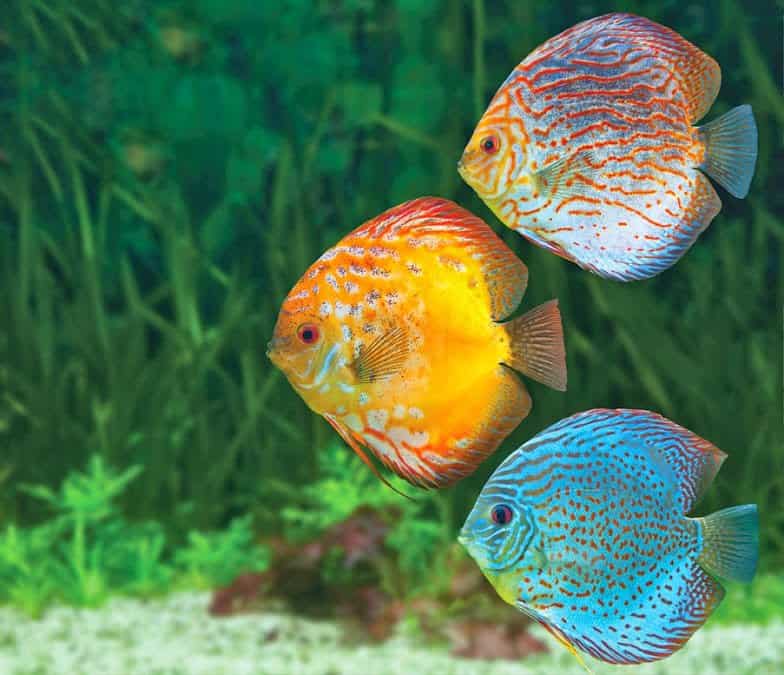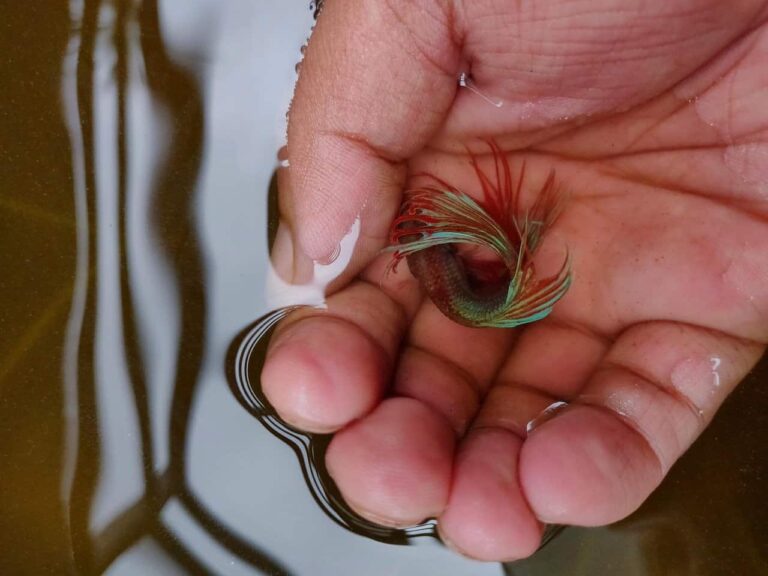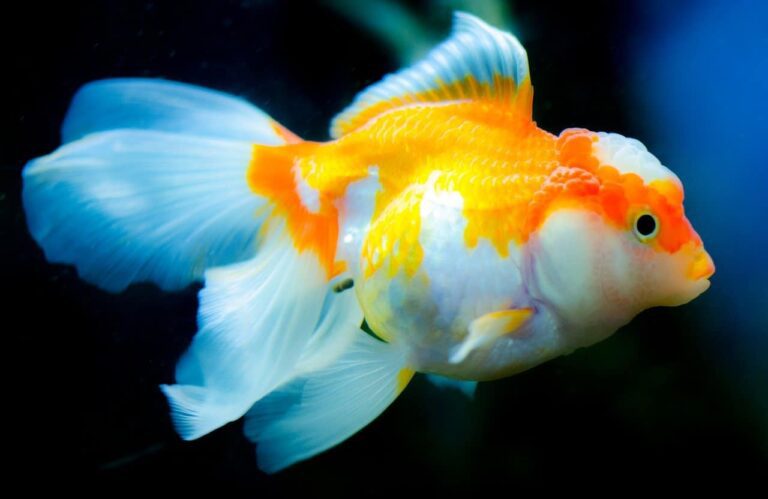Are you feeding the right food to your tropical fish? Or maybe, you’re a nutrition expert and you do know what food your fish are fond of gobbling. But do you know that there are a lot more things to consider before selecting the right food for your fish?
Well, this guide is designed to coach you how you can find the best food for your tropical fish that covers both their nutrition and taste facts. Yes, you read it right, they also have their own taste buds! And, the second part of this guide will cover “How to feed them, like an expert!” So let’s begin.

Best Food for your Tropical Fish
You love your fish and always want to give them the best food they can have. But the only way for you to know whether the food you are giving is good or not is to perform testing. That’s correct, but the problem lies when you give them the wrong food first, and it eventually ruins the whole aquarium. Just because you see they are gobbling up the food does not actually means those are good for them.
So how do you know upfront about the nutrition fact of your food? Well, you have to figure out the ingredients that are in that food first. To be more specific, you have to know about all the vital vitamins and supplements that are good for the overall nutrition of your tropical fish.
Vitamins & Other Essential Supplements
Now, let’s consider about the Vitamin D first, which is known to be one of the most recommended vitamins in case of feeding your tropical fish. Essential amount of this vitamin, as well as other vitamins, can provide the food with an abundance of nutrition. However, a properly blended food which contains all necessary ingredients including proteins, carbohydrates, minerals, and iron can also ensure the presence of all vital vitamins in your food.
Okay, now you know about all the vital ingredients that are necessary to ensure your food’s nutrition. But another way for you to know which special type of food or “brand” would impact more on your fish is to ask the store manager. They can give you a practical recommendation in case of selecting the right food for your tropical fish.
Taste Buds & Occasional Treats for your Fish!
Now, do you remember on the beginning where I talked about “taste buds”? Yes. Our fish also have their own “taste buds” just like us. And, just because your fish are absorbing all the food doesn’t mean they are good for their health. You can, for an experiment, throw some small piece of bread on the aquarium and see their reaction. They will probably gobble all the pieces eventually but they are certainly not good for their health.
What most of us usually get it wrong is, just because they are eating them doesn’t mean they are palatable. Or let’s assume they taste good for the fish, but if the food is not completely balanced, you are definitely giving them the wrong kind. So now we can conclude that your food should be both balanced and palatable. You can also take recommendations this time from the store manager and taste it for a few days to ascertain whether your fish likes it or not.
Now, I can assume, you have got an effective strategy and knowledge to find out the best possible food for your tropical fish. But do you know the type of fish you have on your aquarium also determines the kind of food you should provide? Well, that’s the last thing you definitely should consider.
If you have a diversified kind of catfish in your aquarium and some of them are vegetarian kinds, you can apply Spirulina with your food. Spirulina is a blue-green kind of algae that you can buy reasonably from most of the pet stores. They are basically a small sinking round tablet for your vegetarian fish. Drop one or two in the aquarium and let them sink to the bottom. Your fish will eventually consume them.
Some dried live foods that contain krill and bloodworms can also do well as occasional food for your tropical fish. The brine shrimp, also known as an ice-cream for your tropical fish, gives them a palatable experience. The integrated application of all these foods with spirulina will definitely ensure a balanced and proper diet for your tropical fish.
Secret “Power-Supplements” for your Fish!
Now you have come into the most exciting part, the “power-supplements”. Yes! Just like some of us take supplements for transforming our body in a short time. But in that case, both aesthetic and growing indications you can consider for your tropical fish.
To experiment it successfully, you can buy some inexpensive fish and store them into a separate aquarium. Now, apply some new branded supplements and test the results. You can also change the food after a relevant time and apply a different type of food in terms of their brand name and contained ingredients.
This way, you can actually figure out your own invented “power-supplement” for your tropical fish and apply them to bring in a new change for your overall aquarium. Now, the next part of this guide will cover “How to feed your tropical fish, like an expert”. You can take notes which you’ll find crucial while applying.
Feed your Tropical Fish like an Expert
There are three crucial things you must consider while feeding your tropical fish.
- Have a fundamental knowledge about your fish and their food.
- Know how to feed them correctly.
- Which acts you must avoid and concern for while applying.
Types of Tropical Fish and their Levels of Approaching Food
 To begin with, let’s know about the three kinds of fish and their levels of approaching their food. These are the Surface feeders, Mid-level feeders & the Bottom feeders. Let’s learn about each of them.
To begin with, let’s know about the three kinds of fish and their levels of approaching their food. These are the Surface feeders, Mid-level feeders & the Bottom feeders. Let’s learn about each of them.
The Surface feeders are used to take food from the surface area of the water. Hatchetfish and Gouramies are two of their examples. They have upturned mouths and are fond of taking floating foods. On the other hand, The Mid-level feeders have forward-facing mouths & they are fond of taking sinking food that sinks a bit above from the surface. Barbs and Tetras are two of their examples.
The last category is the Bottom feeders. They are fond of taking food from the surface of the aquarium and have downward-facing mouths. Plecos and Cory Catfish are their examples. You have to make sure your food is as much heavier to reach the surface of your aquarium for this special type of fish category.
Fish with Different Food Preferences Like You Do!
Now you have to know another three types of fish and their food preferences. These are Carnivores, Herbivores & Omnivores. Carnivores like large and protein-rich food. They can even eat a whole small fish if you got some. They have usually large mouths and sharp teeth.
Herbivores, on the other hand, have a small stomach and flat teeth. They prefer small plants and vegan ingredients. You can feed them more frequently and in a short amount. Omnivores are the one that covers almost all other kinds. They don’t have any special preferences and they are fond of diversified kinds of food as per their class.
Kinds of Food for Your Tropical Fish
To conclude the first point, now we only have to know three kinds of “food” for your tropical fish. These are Dry food, Frozen food & Live food. Dry food consists of flakes, pellets, tablets, and sticks. Next, the types of Frozen food can vary in terms of their nutrients. You can store them in the refrigerator and apply them when necessary.
Last one, the live food are some small fishes or worms that cover brine shrimp and krill. Other kinds include small pieces of vegetables like carrot, potato, or cucumber which you can also give to your tropical fish.
The Experts Guide to Feed Your Tropical Fish
Now, let’s learn about the correct way to feed them. You should feed your fish one time a day. As the fish are usually cold-blooded, you can keep the temperature of your aquarium between 74-78 degrees. Then, it will take around 16-24 hours for your fish to digest their food. But in cases, you can also feed them more than once a day, but you have to make sure those are in small portions and definitely be aware of overfeeding. An automatic fish feeder could come in handy to make life easy.
Okay, let’s learn about how to drop them. Well, you can sprinkle the food across the aquarium and it will generally take your fish 5 minutes to consume all. Longer than this time denotes to overeating which you should also be aware of.
Once your fishes finish their eating, you should clear out the whole aquarium for excess food. Otherwise, it may eventually grow bacteria and ruin your whole aquarium. So make sure you also clean them immediately if they unfortunately occur and go into the stomach of your fish.
Not-to-mention, just because your fishes are swimming near the surface after eating enough food doesn’t mean you should give more, in this case, you must ignore them. Because they are used to behave like this and it will result in overeating.
Additional Read: Betta Fish Feeding Guide
Some Mistakes You Must Avoid
Lastly, let’s know about some common mistakes that we should avoid while applying all the strategies.
- Don’t give them the same meal for a long period. Instead, you can diversify their kinds & change it frequently to make sure your fish don’t get bored of absorbing the same food over & over again. However, it will help your fish to stay healthy, strong, and colorful.
- Feed your fish quite often. If you have some fish that are young and below three months, you should feed them more frequently. But make sure all the intervals provide a small portion of food for their stomachs to absorb.
Final Words
To sum up, you know about your fish more than we do. It doesn’t matter if you have been feeding them wrong for a long time. But as a living creature, your fish also have the same adaptability as we all have within us.
This guide is only designed for you to grow up your tropical fish while having a piece of extensive knowledge about their food & the tactics to feed them correctly. We believe our guide helps you to be more resourceful and acquainted about your tropical fish. Thanks for reading the whole article, stay tuned with us for more valuable info-guides like this.
You may like the below article as it is quite relevant –






